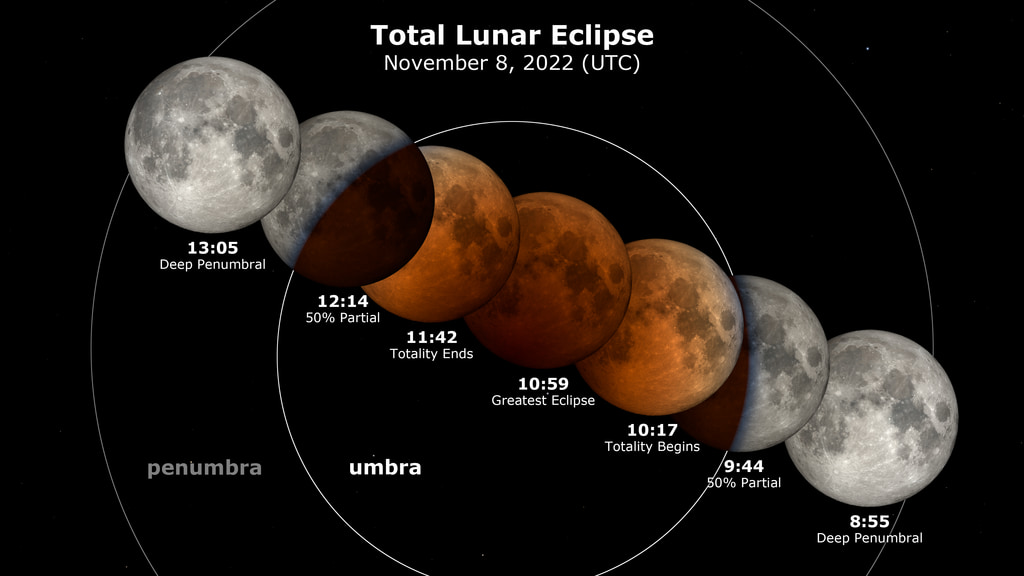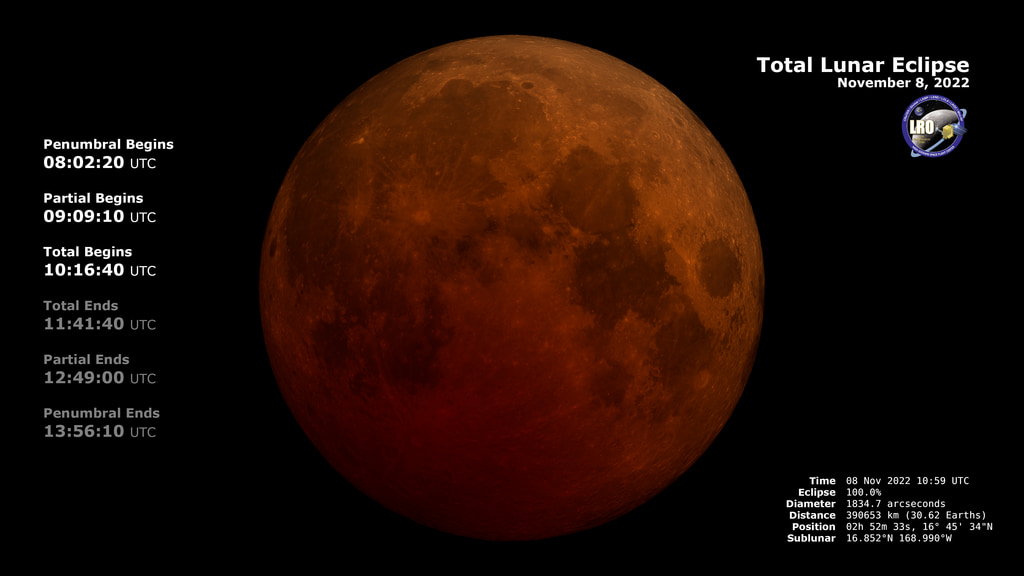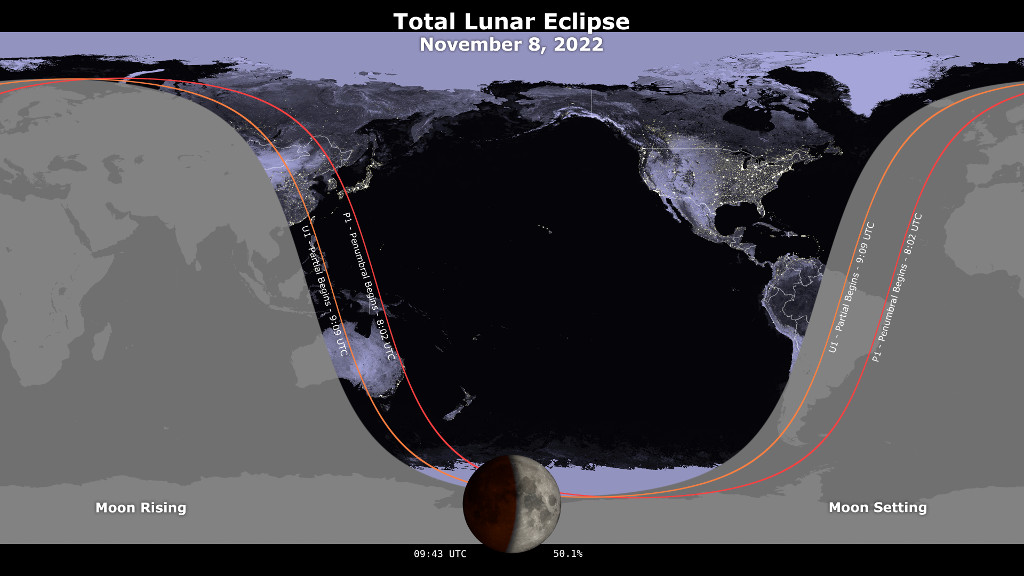Skywatcher’s Delight: Find out how you can catch the Nov. 8 total lunar eclipse

Click here to find out everything you need to know about Tuesday's LUNAR ECLIPSE
Click here for quick link to table of ECLIPSE TIMES
Click here for quick link to canned interview in Spanish with Francisco Andolz
Quick link to edited B-ROLL for interviews
Click here for a quick link to a canned interview with Noah Petro
Skywatcher’s Delight! Next Week’s Total Lunar Eclipse Will be Visible Across the U.S. Last One Visible Until 2025
Save the date for an extra special Tuesday! On Tuesday, Nov. 8 residents from coast to coast across the United States will be treated to a total lunar eclipse that morning.
A lunar eclipse occurs on a full Moon when the path of the Moon's orbit takes it into Earth's shadow, shielding it from the Sun. The light from all the sunrises and sunsets on Earth are cast on the Moon, giving it a temporary reddish color.
Find out more about the Nov. 8 eclipse here and check out the chart below to see times: https://moon.nasa.gov/news/185/what-you-need-to-know-about-the-lunar-eclipse/. The next total lunar eclipse visible across the U.S. won’t be until 2025!
NASA has been studying the Moon in unprecedented detail for the last 13 years with its Lunar Reconnaissance Orbiter spacecraft (LRO), mapping the entire lunar surface to support science and future exploration by both humans and robots. The mission has been awarded a 3 year extension, taking operations to at least 2025, and will continue to shed new light on our nearest neighbor in space.
For more information check out: https://moon.nasa.gov/ and on social media at @NASAMoon
Suggested Questions:
1. We’ll get some excitement looking at the Moon tomorrow morning! What makes tomorrow’s Moon so special?
2. You said the Moon will turn red during the lunar eclipse, why is that?
3. We’re coming up on the 50th anniversary of Apollo 17, the last time humans walked on the Moon. And in just a few weeks NASA will make its next attempt to launch its Mega Moon rocket that will carry humans back to the Moon. Can you tell us more about NASA’s Artemis program?
4. NASA has been studying the Moon in incredible detail with the Lunar Reconnaissance Orbiter for 13 years and it turns out the Moon is much more dynamic than we had thought. What are some of your favorite things we have learned about our Moon?
5. Why do we want to send astronauts to the Moon? What is it about the Moon that we still need to learn?
6. Where can our viewers go to learn more about the Moon, Artemis, and all the great work being done by the Lunar Reconnaissance Orbiter?
Questions for longer interviews:
How does our Moon help us better understand other planets and moons in our solar system?
How is the Lunar Reconnaissance Orbiter helping to usher in a new era of lunar science?
* A lunar eclipse must be a rough ride for a solar-powered lunar orbiter. What does the Lunar Reconnaissance Orbiter have to do to prepare for an eclipse?
Do you have feedback for the Live Shot Program or want to be removed from our contact list? We would love to hear from you HERE!

Table of eclipse times and information.
Canned interview in Spanish with NASA expert Francisco Andolz.
Edited b-roll for lunar eclipse interviews. Graphics are separated by a slate with the associated question. TRT 8:28. Graphics go with the following questions:
What's happening with the Moon tomorrow?
Why will the Moon turn red?
Tell us about NASA's Artemis mission back to the Moon?
This year marks the 50thh anniversary of the last human mission to the Moon. As we gear up for astronauts with the Artemis mission to step foot on the Moon, can you talk about some of the differences between these two programs?
NASA has a probe orbiting the Moon right now called the Lunar Reconnaissance Orbiter. What are some of teh cool things we've learned over it's 13 operational years?
What do we still need to learn about the Moon? Why send astronauts there?
Where can viewers go to learn more about the Moon, Artemis and the LRO mission?
Canned interview with Dr. Noah Petro / LRO Project Scientist. Click here for his BIO. TRT 8:23. SOTS are separated by slates with the associated question. Full transcript is available under the download button
Questions include:
What makes tomorrow's Moon so special?
You said the Moon will turn red during the lunar eclipse, why is that?
We're coming up on the 50th anniversary of Apollo 17, the last time humans walked on the Moon. And in just a few weeks NASA will make its next attempt to launch its Mega Moon rocket that will carry humans back to the Moon. Can you tell us more about NASA's Artemis program?
NASA has been studying the Moon in incredible detail with the Lunar Reconnaissance Orbiter for 13 years and it turns out the Moon is much more dynamic than we had thought. What are some of your favorite things we have learned about our Moon?
Why do we want to send astronauts to the Moon? What is it about the Moon that we still need to learn?
Where can our viewers go to learn more about the Moon, Artemis, and all the great work being done by the Lunar Reconnaissance Orbiter?
How does our Moon help us better understand other planets and moons in ourr solar system?
How is the Lunar Reconnaissance Orbiter helping to usher in a new era of lunar science?
A lunar eclipse must be a rough ride for a solar-powered lunar orbiter. What does the Lunar Reconnaissance Orbiter have to do to prepare for an eclipse?
For More Information
Credits
Please give credit for this item to:
NASA's Goddard Space Flight Center
-
Producers
- Michelle Handleman (KBR Wyle Services, LLC)
- Jessica Sansarran (NASA)
- Christina Brooke Mitchell (KBR Wyle Services, LLC)
- Pedro Cota (ADNET Systems, Inc.)
- Noelia Gonzalez Moreira (ADNET Systems, Inc.)
-
Technical support
- Aaron E. Lepsch (ADNET Systems, Inc.)
-
Editor
- Michael Starobin (KBR Wyle Services, LLC)
Series
This page can be found in the following series:Release date
This page was originally published on Tuesday, November 1, 2022.
This page was last updated on Wednesday, May 3, 2023 at 11:43 AM EDT.


